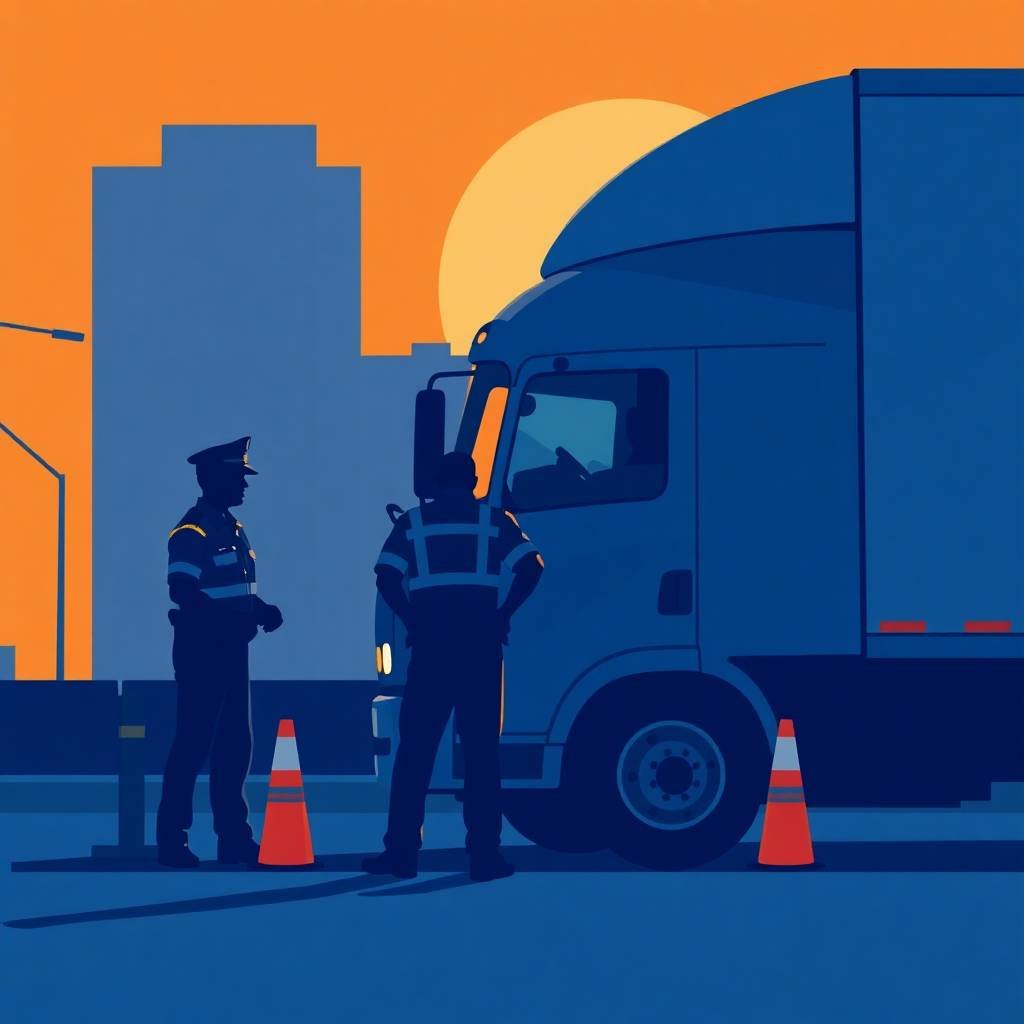1. Poor Recordkeeping: The Fastest Way to Fail an FMCSA Audit
When it comes to surviving an FMCSA audit, few things will sink your chances faster than poor recordkeeping. Owner-operators and small fleets are especially vulnerable, often overwhelmed by daily operations and unaware of critical compliance gaps until it’s too late. That’s why professional FMCSA compliance services for owner-operators are more essential than ever in 2025.
If your paperwork is incomplete, outdated, or disorganized, you’re not just at risk—you’re a target for penalties, fines, and a downgraded safety rating.
Why Poor Recordkeeping Triggers Immediate Red Flags
The FMCSA doesn’t just audit your operation—they audit your documentation. Inspectors want to see a clear paper trail for every aspect of your business: driver qualifications, hours of service, drug testing, vehicle maintenance, insurance, and Unified Carrier Registration (UCR). Even one missing or unverifiable document can trigger a violation.
Our How to Prepare for a Compliance Review article outlines the key records auditors demand. Without a system in place, scrambling to find or recreate files under pressure is a recipe for failure. This is where FMCSA compliance services for owner-operators become your safety net, helping you maintain organized, audit-ready documentation year-round.
Driver Qualification Files: A Top Violation Area
One of the most common audit failures is incomplete or outdated Driver Qualification Files. These must include employment history, MVRs, medical certificates, drug testing results, and proof of CDL. Our guide on Driver Qualification File Requirements walks you through everything that should be on file and current.
FMCSA compliance services for owner-operators ensure these documents are collected, updated, and stored securely—avoiding one of the most frequently cited violations in FMCSA audit reports.
Disorganization Can Lead to Penalties and Suspension
The Federal Motor Carrier Safety Administration issues substantial fines for poor or missing records. Repeat violations or widespread disorganization can even result in suspension of your DOT authority. Inconsistent Hours of Service logs, late UCR filings, and gaps in safety inspections are all signals that your operation isn’t being managed properly.
The DOT Compliance Checklist for Owner-Operators is a valuable tool to help you track essential documentation and deadlines. But maintaining it manually is time-consuming. That’s why our FMCSA compliance services for owner-operators automate recordkeeping and alert you to what’s missing—before the FMCSA does.
Ongoing Monitoring Protects Your Business
Compliance isn’t just about passing audits—it’s about staying prepared every day. Our services include routine monitoring of safety scores, document expirations, and registration deadlines, including critical UCR Filing Deadlines. We align every detail with FMCSA Compliance Requirements for Trucking Companies, helping you avoid risks before they become violations.
Book a Compliance Strategy Session Today
Avoiding penalties starts with getting organized. Schedule your FMCSA compliance review session now and let us help you build a secure, audit-ready system from the ground up.
With expert FMCSA compliance services for owner-operators, you’ll never be caught off guard again. Maintain your authority. Protect your reputation. Pass your audits with confidence.
2. Neglecting MCS-150 Updates: A Costly and Common Oversight
For many trucking businesses, especially small fleets and owner-operators, compliance often takes a backseat to day-to-day operations. But one of the most overlooked—and frequently penalized—requirements is the MCS-150 update. Ignoring this simple form can lead to major consequences, including deactivation of your USDOT number. That’s why relying on FMCSA compliance services for owner-operators is the smartest way to stay ahead.
The MCS-150 is more than a routine update—it’s your official profile with the Federal Motor Carrier Safety Administration (FMCSA). Letting it lapse means putting your authority, reputation, and income at risk.
What Is the MCS-150 and Why Does It Matter?
The MCS-150 is a biennial update form required by the Federal Motor Carrier Safety Administration for all carriers with an active USDOT number. This form provides essential information about your business: fleet size, operation type, mileage, and contact details.
Failure to update it as required—every two years or when your information changes—can trigger deactivation of your DOT number. Once deactivated, you’re legally barred from operating. Professional FMCSA compliance services for owner-operators ensure that this critical deadline is never missed, and that the data submitted reflects your actual operation accurately.
The Cost of Forgetting Your Update
Missing your MCS-150 update deadline doesn’t just interrupt your operations. It can lead to rejected loads, lost contracts, and higher scrutiny from DOT officers. Carriers who fail to update on time may also experience delays in UCR filings and disruptions in their CSA score tracking.
Our UCR Filing Deadlines article explains how one oversight can snowball into multiple non-compliance issues. With expert FMCSA compliance services for owner-operators, these problems are prevented long before they affect your operations.
Why Owner-Operators Are Especially Vulnerable
Unlike large carriers with full-time compliance departments, owner-operators handle everything—from dispatch to maintenance. It’s easy to miss regulatory updates like the MCS-150, especially when you’re managing long hours on the road.
Our team at Truckers Compliance Hub provides automated tracking, document alerts, and filing support tailored specifically for small carriers. FMCSA compliance services for owner-operators aren’t just convenient—they’re essential to avoiding costly oversights.
Integrated Recordkeeping That Works
We don’t just handle your MCS-150—we integrate it into your entire compliance strategy. That includes Driver Qualification Files, drug testing logs, and safety score monitoring. You can see how our system supports full audit readiness in the DOT Compliance Checklist for Owner-Operators, designed to help you stay fully aligned with federal expectations.
Our approach is also informed by government guidance from both FMCSA.gov and Transportation.gov, ensuring your business is protected and prepared.
Avoid Suspension—Book Your Compliance Review Today
Don’t let a missed MCS-150 filing shut you down. Schedule your FMCSA compliance session now to get professional support and ensure every detail of your operation is current, accurate, and compliant.
With reliable FMCSA compliance services for owner-operators, you’ll never worry about missed updates, deactivation threats, or preventable penalties. We keep your files in order, your deadlines on track, and your trucks on the road—where they belong.

3. Improper Drug and Alcohol Testing Program Enrollment
Among the most common FMCSA violations for small carriers is improper or incomplete enrollment in a drug and alcohol testing program. For owner-operators, the consequences are severe—fines, out-of-service orders, or revoked operating authority. The solution? Enroll in a proper program and maintain ongoing compliance through trusted FMCSA compliance services for owner-operators.
This requirement isn’t optional. It’s federally mandated under 49 CFR Part 382 and strictly enforced. Even a single oversight can derail your trucking business.
Understanding Drug and Alcohol Testing Obligations
If you operate a commercial motor vehicle (CMV) requiring a CDL and your truck operates interstate, you’re required to participate in a DOT-approved drug and alcohol testing program. Enrollment must include pre-employment testing, random testing, post-accident testing, and follow-up testing protocols.
Owner-operators must also designate a Consortium/Third-Party Administrator (C/TPA) to manage random selection and compliance documentation. This is where FMCSA compliance services for owner-operators become critical. A reliable provider will not only enroll you in a compliant program but ensure every test, record, and result is accurately managed and accessible.
The Hidden Risks of Non-Enrollment
The FMCSA regularly conducts roadside inspections and new entrant audits. If you cannot provide documentation proving your enrollment in a compliant program, you risk immediate enforcement action. Penalties range from thousands of dollars in fines to being placed out of service on the spot.
According to the FMCSA Drug and Alcohol Testing Regulations, owner-operators must be enrolled in a program before driving a single mile. FMCSA compliance services for owner-operators ensure that enrollment is complete and up to date, and that records are properly stored in case of audit.
Avoiding Audit Failures with Professional Oversight
Improper or missing enrollment can also lead to audit failure. During a compliance review, investigators will ask for proof of:
- Random testing participation
- Chain of custody forms
- Pre-employment test results
- Clearinghouse registration and query history
Our article on How to Prepare for a Compliance Review highlights how disorganized or missing documentation frequently leads to conditional ratings or loss of authority.
With FMCSA compliance services for owner-operators, everything is handled for you—random selections, paperwork management, FMCSA Clearinghouse compliance, and integration with your Driver Qualification File Requirements.
Stay Aligned with Federal Requirements
In addition to the FMCSA, the Department of Transportation provides further guidelines that all carriers must follow. Our DOT Compliance Checklist for Owner-Operators includes drug testing documentation and monitoring, ensuring full alignment with both FMCSA and DOT rules.
Schedule Your Compliance Review Today
If you’re unsure whether your drug and alcohol program is compliant—or if you’re enrolled at all—it’s time to act. Schedule a compliance review session today to get expert support and avoid enforcement actions.
Professional FMCSA compliance services for owner-operators protect your business, keep your authority active, and help you pass audits with confidence. Stay compliant. Stay enrolled. Stay on the road.
4. Misunderstanding HOS and ELD Requirements
For many small carriers and independent drivers, Hours of Service (HOS) and Electronic Logging Device (ELD) regulations remain two of the most confusing areas of FMCSA compliance. Yet misunderstanding these rules is one of the fastest ways to rack up violations—and even face an audit. That’s why smart carriers rely on FMCSA compliance services for owner-operators to navigate these complex, high-risk requirements.
With enforcement tightening in 2025, there’s no room for guesswork. The penalties for HOS and ELD violations are serious, and they accumulate quickly.
Why HOS Violations Are So Common
Hours of Service rules regulate how long drivers can operate commercial vehicles before resting. These limits are designed to prevent fatigue-related crashes. The Federal Motor Carrier Safety Administration outlines maximum driving limits, required rest breaks, and reset periods. But many owner-operators unintentionally break the rules due to confusion, outdated knowledge, or improper recordkeeping.
That’s where FMCSA compliance services for owner-operators make a difference. With expert assistance, drivers gain a clear understanding of how to log time correctly, avoid split-sleeper confusion, and stay compliant during inspections.
The ELD Mandate: Still Misunderstood
Although the ELD mandate has been in effect since 2019, many small fleets still struggle to use these devices correctly. ELDs are required for most interstate drivers and must sync with the vehicle’s engine to record drive time automatically.
Common violations include:
- Failing to log in or out
- Not annotating edits
- Using unregistered or non-compliant ELD systems
Our article on How to Prepare for a Compliance Review explains how ELD recordkeeping is one of the first things auditors inspect. Without a solid grasp of device functionality and reporting requirements, carriers risk immediate fines or operational shutdowns.
The Role of Compliance Services in Preventing Errors
Professional FMCSA compliance services for owner-operators eliminate these risks through real-time monitoring, log audits, and regulatory training. At Truckers Compliance Hub, we help drivers interpret rule updates, manage ELD malfunctions, and prepare HOS documentation for roadside inspections and DOT audits.
We also ensure ELD and HOS compliance integrates seamlessly with other requirements like Driver Qualification File Requirements and UCR Filing Deadlines.
Avoiding Costly Fines and Audit Failures
HOS and ELD violations directly impact CSA scores and trigger audits. Repeat offenses can lead to increased insurance rates and contract denials. The Department of Transportation and FMCSA publish penalty schedules showing how a single hours-related violation can cost over $1,000. Non-compliance with the ELD rule is subject to out-of-service orders.
By using FMCSA compliance services for owner-operators, you avoid these consequences and operate with confidence.
Get Help Before Mistakes Cost You
If you’re unsure about ELD configuration or HOS rules, it’s time to consult a professional. Book your compliance review today and let us help you build a plan that prevents errors before they happen.
With trusted FMCSA compliance services for owner-operators, you stay in control of your hours, your records, and your future on the road.

5. Missing or Incomplete Driver Qualification Files (DQFs)
Driver Qualification Files (DQFs) are one of the most critical elements of DOT compliance—and one of the most common areas where carriers fail. Whether you’re a solo operator or running a growing fleet, ignoring or mismanaging DQFs can instantly put your operation at risk. That’s why FMCSA compliance services for owner-operators are essential in 2025.
If your DQFs are missing documents, outdated, or poorly maintained, you’re vulnerable to audits, fines, and operational suspensions. Avoiding these costly setbacks starts with understanding exactly what’s required and ensuring your records are airtight.
What Is a DQF and Why It Matters
The Federal Motor Carrier Safety Administration (FMCSA) mandates that all employers of commercial drivers maintain a complete Driver Qualification File for each driver. These records prove that each driver meets the minimum requirements to operate a commercial motor vehicle safely. According to FMCSA regulations, DQFs must include:
- Employment application
- Motor Vehicle Records (MVR)
- Medical examiner’s certificate
- Road test certification
- Annual MVR reviews
- Drug and alcohol test results, if applicable
Failure to produce these during a safety audit can result in major violations and penalties. Working with FMCSA compliance services for owner-operators ensures these records are current, organized, and audit-ready at all times.
DQF Violations Are a Red Flag in Audits
DQF deficiencies are among the first things auditors examine. Missing medical certificates, outdated MVRs, or lack of proper documentation can trigger an automatic compliance failure. In our detailed post on Driver Qualification File Requirements, we highlight the exact checklist used during inspections.
When you partner with FMCSA compliance services for owner-operators, you’ll receive proactive file audits, timely updates, and tools to ensure each file meets federal standards. These services are vital whether you’re undergoing a New Entrant Safety Audit or a random roadside inspection.
Avoiding Common Mistakes with Professional Support
Owner-operators often fall into traps like using outdated forms, storing files improperly, or forgetting annual updates. These issues may seem small but carry heavy consequences. Through professional FMCSA compliance services for owner-operators, you avoid:
- Misfiled documents
- Expired credentials
- Missing road test verifications
- Disorganized file formats
For added protection, refer to our DOT Compliance Checklist for Owner-Operators to cross-reference your responsibilities.
Regulatory Risks and Penalties
The Department of Transportation and FMCSA have intensified enforcement in 2025, especially for companies with poor documentation. A single incomplete DQF can lead to thousands in fines, downgraded safety ratings, and even deactivation of your operating authority. Don’t let paperwork be the reason your trucking business hits the brakes.
Secure Your DQFs with Expert Guidance
If you’re unsure whether your DQFs are compliant, now is the time to act. Schedule a professional compliance review today to assess your current files and fix any issues before the next audit.
Our team specializes in FMCSA compliance services for owner-operators, giving you peace of mind and protecting your ability to stay on the road. Let us handle the paperwork while you focus on driving your business forward.

6. Ignoring CSA Score Warnings
Ignoring CSA Score Warnings: A Costly Mistake That Threatens Your Authority
CSA (Compliance, Safety, Accountability) scores are not just numbers—they are safety performance metrics that directly affect your trucking business. For owner-operators, these scores influence everything from roadside inspection frequency to your ability to book freight with reputable brokers. Ignoring CSA score warnings is a critical misstep, but it can be avoided with the right support. That’s where FMCSA compliance services for owner-operators become your strongest ally.
What CSA Score Warnings Really Mean
When the Federal Motor Carrier Safety Administration flags a motor carrier for high BASIC (Behavior Analysis and Safety Improvement Categories) scores, it’s not just a slap on the wrist—it’s a precursor to serious action. High CSA scores lead to warning letters, increased DOT inspections, potential audits, and even loss of operating authority.
Through FMCSA compliance services for owner-operators, small fleets and solo drivers can receive expert-level monitoring to interpret CSA score changes, investigate root causes, and take action before the government does. These services offer timely alerts and hands-on help to reduce violations before they spiral into major compliance issues.
The Financial and Operational Risks of Inaction
Ignoring CSA warnings damages more than your score—it impacts your business. Shippers and brokers regularly consult the FMCSA’s Safety Measurement System (SMS) to vet carriers. High-risk scores reduce your ability to win profitable loads and can drive up your insurance premiums.
Implementing FMCSA compliance services for owner-operators can reduce this risk by keeping your safety management practices audit-ready. With expert guidance, you’ll ensure that issues such as improper driver qualification files, missed drug tests, or logbook violations don’t drag your CSA score down.
How to Respond to CSA Warnings Immediately
The best time to act on a CSA warning is the moment you receive it. A professional review session with compliance experts can help identify exact problem areas. To schedule a tailored compliance review session, book your appointment here.
Also, use resources such as the Driver Qualification File Requirements guide or the FMCSA Compliance Requirements for Trucking Companies to begin strengthening weak areas right away.
FMCSA compliance services for owner-operators provide ongoing support to manage audit preparation, documentation, safety training, and digital recordkeeping—all factors that directly influence your CSA standing.
Turn CSA Scores Into a Strength, Not a Liability
The difference between losing your authority and elevating your credibility lies in how you respond to FMCSA feedback. Working with FMCSA compliance services for owner-operators ensures you stay ahead of violations by developing proactive safety programs and maintaining a clean compliance profile.
In 2025, enforcement standards are expected to tighten. Owner-operators should expect more frequent audits and less tolerance for violations. That’s why having reliable FMCSA compliance services for owner-operators is no longer a luxury—it’s a strategic necessity.
Whether your CSA scores need recovery or maintenance, professional help is available. Start your path toward clean scores and safer operations by trusting proven FMCSA compliance services for owner-operators to guide your company forward.
7. No Audit Preparation Strategy in Place: A Risk Owner-Operators Can’t Afford in 2025
If you’re an independent trucker or managing a small fleet, the thought of a DOT audit might seem distant—until it’s not. FMCSA audits can come with little warning, and lacking a proper audit preparation strategy can be catastrophic for your business. Without FMCSA compliance services for owner-operators, many carriers are left scrambling, unorganized, and vulnerable to violations that threaten their operating authority.
The Audit Trap: Why Waiting Is a Losing Strategy
Federal Motor Carrier Safety Administration (FMCSA) audits are increasingly data-driven and frequent. Whether triggered by poor CSA scores, a roadside inspection, or random selection, audits demand thorough documentation, accurate records, and proof of regulatory compliance. Many carriers think they’re ready—until they’re asked for a Driver Qualification File or evidence of a functioning drug and alcohol testing program.
By investing in FMCSA compliance services for owner-operators, you’re not just getting help filling out forms; you’re securing a strategic approach that ensures your operation is always prepared for review.
What a Solid Audit Preparation Strategy Includes
An audit strategy isn’t just a checklist—it’s a proactive system that covers driver qualification, Hours of Service logs, maintenance records, and more. For example, if you’re unsure whether your DQ files are audit-ready, consult our Driver Qualification File Requirements post to understand what DOT auditors expect.
FMCSA compliance services for owner-operators include monthly record checks, digital file systems, CSA monitoring, and personalized alerts for renewal deadlines. This level of preparation transforms the audit process from a stressful event into a routine checkup.
Small Carriers Face Greater Scrutiny
Owner-operators and small carriers often assume that auditors focus only on large fleets. This is a dangerous myth. In reality, smaller carriers face tighter scrutiny because their operations tend to lack internal compliance departments.
Using FMCSA compliance services for owner-operators, even the smallest businesses can function with the professionalism and accuracy of a large fleet. These services ensure you’re not blindsided when the FMCSA calls or shows up at your door.
Booking Your Compliance Strategy Session
If you currently operate without a structured audit plan, now is the time to act. We recommend booking a free compliance consultation with a compliance expert who can assess your current risks and help develop a tailored strategy.
You can also browse our guides, like the DOT Compliance Checklist for Owner-Operators and How to Prepare for a Compliance Review, to begin organizing your documentation.
Additionally, consult the official FMCSA audit guide and the DOT’s Small Entity Guide for federal expectations.
Peace of Mind Starts with Preparation
Ultimately, avoiding FMCSA fines and suspensions is about more than luck—it’s about preparation. With FMCSA compliance services for owner-operators, you gain a team that helps ensure your files, processes, and records are audit-ready every day of the year.
Don’t wait for the warning letter. With so much on the line, every owner-operator should make audit readiness a core business function—and professional FMCSA compliance services for owner-operators make that possible.
What is FMCSA compliance and why is it important for owner operators?

FMCSA compliance refers to meeting the Federal Motor Carrier Safety Administration’s regulations for commercial motor vehicle operations. For owner-operators, staying compliant helps avoid costly fines, audit failures, and possible shutdowns. It also builds trust with brokers and clients.
What are the most common FMCSA violations that lead to audit failure?

Some of the most common violations include missing or outdated driver qualification (DQ) files, poor record-keeping of drug and alcohol testing, ELD violations, and incomplete maintenance logs. These red flags can quickly escalate into audit penalties.
Do I need a DQ file if I’m an owner-operator with no employees?

Yes. Even if you’re the only driver, FMCSA requires you to maintain a DQ file for yourself. This includes your medical certificate, MVRs, employment history, and other documents proving you meet federal safety standards.
How often should I update my FMCSA compliance records?

Some records, like the MVR, must be updated annually, while others—like drug test results or vehicle maintenance logs—must be updated immediately upon any changes. Regular monthly reviews are recommended to stay audit-ready.
Can I outsource my FMCSA compliance to a professional service?

Absolutely. Many owner-operators partner with compliance consultants to handle DQ file management, audit prep, and DOT recordkeeping. Services like ours help you stay compliant while you focus on driving and growing your business.
